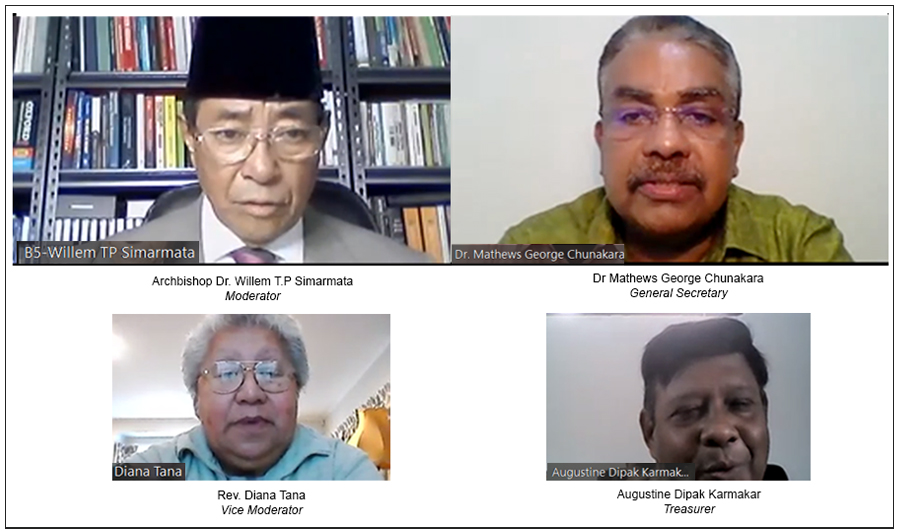Find hope and trust in God’s abundant mercies amidst the crisis, says CCA General Secretary at Executive Committee Meeting

“We have to accept the fact that we live in a fallen and broken world. The present pandemic is a crisis delivered by nature; we must also accept the simple truth that we suffer because of our own mistakes. This period of trial that we are currently undergoing is at a scale that perhaps none of us have ever experienced. We are passing our days in varying degrees of isolation. Worries about our health, finances, and the future we had planned dominate our thoughts. However, we need to place our trust in God and hold on to our faith in God. We need to find strength to face the ups and downs in this arduous journey, and it is through these ups and downs that we will grow in faith,” explained the General Secretary of the Christian Conference of Asia (CCA) Dr Mathews George Chunakara, in a report presented to the Executive Committee of CCA which met online on 9–10 August 2021.
The CCA General Secretary in his annual report shared that the restrictions imposed by the pandemic and strict controls by governments had pushed the CCA to accomplish many things in unique ways. The most significant adaptation was the enhanced use of virtual platforms and social media for the CCA’s programmes and communication.
“Even though we prefer to meet in person for programmes, we see a future in the digitalised world in the long run, as advanced communication methodologies provide new opportunities for our ecumenical engagements. The pandemic now allows us the scope for greater communication and engagements with member churches, partners and networks in Asia and beyond,” he added.
Recalling the Prophetic message in Isaiah (41:10), “So do not fear, for I am with you; do not be dismayed, for I am your God. I will strengthen you and help you; I will uphold you with my righteous right hand,” the General Secretary stated, “If God allows pain, he will give us the strength to go through it, and he will show us the way out of it. We need to learn more readily to accept that this world is no heaven, and perhaps go one step further and see pain and suffering as evidence, probably a sort of precursor, of something better that is yet to come.”
The Executive Committee appreciated the leadership of the General Secretary and other staff as well as the organisation’s adaptation to virtual operation of the CCA’s programmes given the COVID-19 outbreak that has been restricting international travel, noting that sixteen programmes were held since the previous meeting of the Executive Committee in November 2020 and until July 2021, including the month-long Asian Ecumenical Institute, the ten-day long Institute on Human Rights, and the virtual Asia Sunday worship service.
It was also reported that the CCA had been able to organise over 90 percent of the programmes and activities planned and scheduled as part of the five-year strategic programme plan, which was adopted by the Executive Committee and the implementation of which had commenced in January 2016.
The General Secretary added that in addition to these programmes, the CCA has initiated several additional programmes from time to time based on some emerging issues and concerns.
The CCA’s strategic programme plan continues to guide its ongoing programmes, until a new strategic framework for the upcoming post-Assembly period will be worked out and adopted after a review of the ongoing programmes at the General Assembly.
Archbishop Dr Willem T.P. Simarmata, the Moderator of the CCA, in his opening remarks welcomed the members of the CCA's Executive Committee who were meeting virtually for the second time amidst the pandemic. Beseeching God's blessings for recovery and healing, he lamented the deteriorating conditions, the global suffering, and the loss of lives. He acknowledged that the CCA's work had proceeded amidst a terribly difficult situation due to COVID-19 and added that it was necessary to continue to believe that God was in our midst and be obedient to God's calling. He also expressed his prayerful wishes for the two-day deliberations and decisions that were to be made for the future of the CCA.











